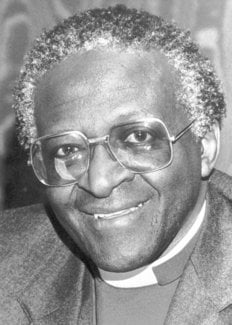Desmond Tutu
Biographical

Bishop Desmond Tutu was born in 1931 in Klerksdorp, Transvaal. His father was a teacher, and he himself was educated at Johannesburg Bantu High School. After leaving school he trained first as a teacher at Pretoria Bantu Normal College and in 1954 he graduated from the University of South Africa. After three years as a high school teacher he began to study theology, being ordained as a priest in 1960. The years 1962-66 were devoted to further theological study in England leading up to a Master of Theology. From 1967 to 1972 he taught theology in South Africa before returning to England for three years as the assistant director of a theological institute in London. In 1975 he was appointed Dean of St. Mary’s Cathedral in Johannesburg, the first black to hold that position. From 1976 to 1978 he was Bishop of Lesotho, and in 1978 became the first black General Secretary of the South African Council of Churches. Tutu is an honorary doctor of a number of leading universities in the USA, Britain and Germany.
Desmond Tutu has formulated his objective as “a democratic and just society without racial divisions”, and has set forward the following points as minimum demands:
1. equal civil rights for all
2. the abolition of South Africa’s passport laws
3. a common system of education
4. the cessation of forced deportation from South Africa to the so-called “homelands”
The South African Council of Churches is a contact organization for the churches of South Africa and functions as a national committee for the World Council of Churches. The Boer churches have disassociated themselves from the organization as a result of the unambiguous stand it has made against apartheid. Around 80 percent of its members are black, and they now dominate the leading positions.
| Selected Bibliography |
| By Tutu |
| Crying in the Wilderness. The Struggle for Justice in South Africa. Edited by John Webster. Grand Rapids, Michigan: Eerdmans, 1982. (Sermons, speeches, articles, press statements, 1978-1980.) |
| Hope and Suffering: Sermons and Speeches. Edited by John Webster. Grand Rapids, Michigan: Eerdmans, 1984. (From the period 1976-1982.) |
| The Rainbow People of God: The Making of a Peaceful Revolution. Edited by John Allen. New York: Doubleday, 1994. (Speeches, letters and sermons from 1976 to 1994, woven together in narrative by his media secretary.) |
| Other Sources |
| du Boulay, Shirley. Tutu, Voice of the Voiceless. London: Penguin Books, 1989. |
| Sparks, Allister. The Mind of South Africa. New York: Knopf, 1990. (Historical interpretation by a distinguished South African journalist.) |
This autobiography/biography was written at the time of the award and first published in the book series Les Prix Nobel. It was later edited and republished in Nobel Lectures. To cite this document, always state the source as shown above.
Desmond Tutu died on 26 December 2021.
Nobel Prizes and laureates
Six prizes were awarded for achievements that have conferred the greatest benefit to humankind. The 12 laureates' work and discoveries range from proteins' structures and machine learning to fighting for a world free of nuclear weapons.
See them all presented here.
